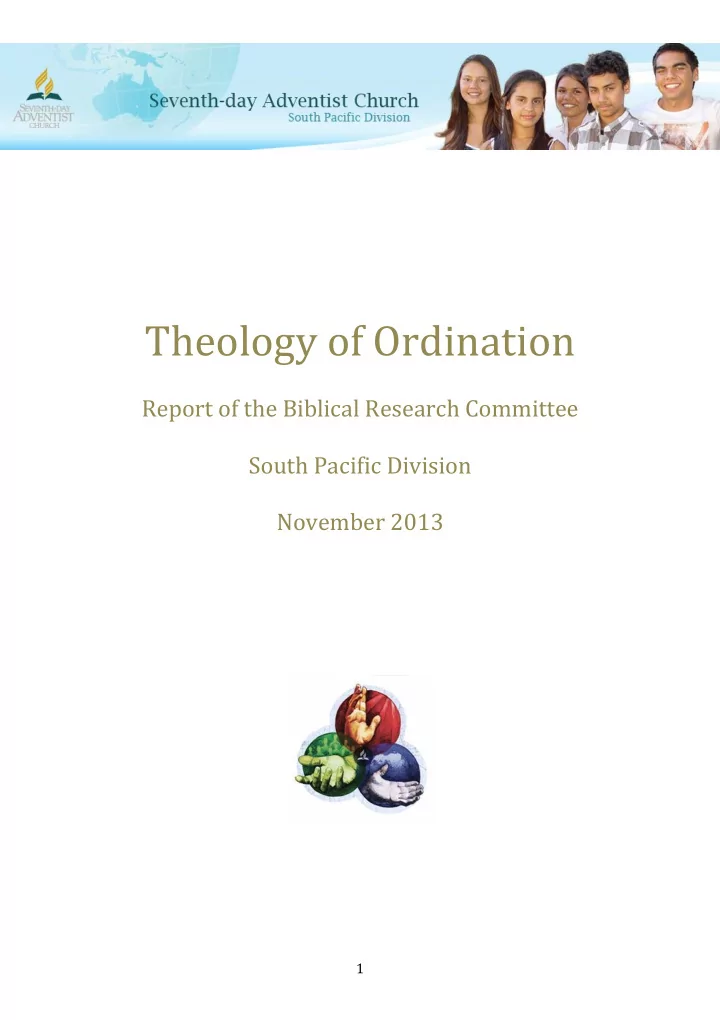

Theology of Ordination Report of the Biblical Research Committee South Pacific Division November 2013 1
The Process: 1 2 3 The Biblical Research Committee of the South Pacific Division was tasked 4 with examining the topic of ordination, first to determine what the Adventist theology 5 of ordination actually is. This was not a simple matter, as it had not really been done 6 before. The church had inherited a tradition out of pragmatic necessities during its 7 infancy, but never really founded the practice of ordaining ministers on biblical 8 teachings per se. At it ’ s meeting in August 2011 the BRC chose a number of scholars 9 from this division to explore the topic and report back. In the two meetings of 2012, 10 papers were read and a report sent to the General Conference’s Biblical Research 11 Institute. This process continued into 2013, with the discussions focussing more on 12 the ordination of women, and a number of conclusions drawn up that are presented in 13 this paper. 14 The members of the Biblical Research Committee in the South Pacific are: 15 Barry Oliver (chair), David Tasker (secretary), Lawrence Tanabose, Jerry Matthews, 16 Leigh Rice, Daniel Reynaud, David Thiele, Neil Watts, Wendy Jackson, Ray 17 Roennfeldt, Ross Cole, Bradley Kemp, Jorge Munoz, Robert McIver, Drene 18 Somasundram, and Branimir Schubert. 19 OBSERVATIONS FOR THE THEOLOGY OF 20 ORDINATION STUDY COMMITTEE 21 22 1. The foundation principle for the resolution of questions regarding 23 ordination is the use of the correct hermeneutic. 24 2. The discussion is driven by our understanding of the nature of the 25 church, its role and its function. 26 3. An Adventist theology of ordination will be based on scriptural 27 principles. 28 4. Where Scripture is silent on current issues, a theology of 29 ordination must be based on the principles of Scripture, taking 30 adequate account of what Scripture says as applied in its local or 31 issue-specific contexts. 32 5. The words translated “ordain” have a very wide usage. 33 6. While the roots of many NT practices can be traced to the OT there 34 is discontinuity between them. There is no practical connection for 35 example, between priests, Levites, elders, and deacons. 36 7. Ordination is a practice driven by mission and practical needs – 37 informed by biblical studies and theology. 38 8. The Bible does not command ordination; however it does 39 encourage the church to develop modes of maintaining order in 40 the exercise of its mission. These modes may go beyond biblical 41 practice but must be consistent with it. 42 9. Ordination is not to be considered a sacrament. Biblical evidence 43 supports the symbolism of the laying on of hands when appointing 44 individuals for a task, but there is no firm evidence for the transfer 45 of grace or virtue in this context. Consequently, we must reject 46 attributing sacramental value to ordination. 2
1 10. The theology of ordination informs and is informed by the practical 2 implementation of our ecclesiology, i.e. the global and local nature 3 of the church, which, expressed in its various forms, facilitates 4 mission. 5 11. The significance of ordination is influenced by culture. In some 6 parts of the world, culture bestows inordinate status upon a 7 minister at ordination. 8 12. EGW considers that ordination contains an experiential element 9 that has its basis in a call from God. Although some women may not 10 be concerned about non-ordination, for others it creates great 11 angst because of their sense of their divine call, which the church 12 does not seem to recognize. 13 Conclusions: 14 15 16 1. The Biblical Research Committee of the South Pacific Division does 17 not see any scriptural principle which would be an impediment to 18 women being ordained. 19 2. The calling of the Holy Spirit needs to be recognized for both men 20 and women. There is a sense of injustice that needs to be 21 addressed. 22 3. The mission of the church is a primary determinant of praxis, both 23 in the history of the Seventh-day Adventist Church, and in its 24 climax as the Holy Spirit is poured out on both men and women 25 during the latter rain. 26 Papers Presented to Date: 27 28 29 “The Language of Ordination in Scripture,” Ross Cole PhD, Avondale College of 30 Higher Education. 31 32 “A Biblical Theology of Ordination,” Kyle de Waal PhD, Avondale College of 33 Higher Education. 34 35 “The Problem of Ordination: Lessons from Early Christian History,” Darius 36 Jankiewicz PhD, Andrews University. 37 38 “Should Ordination be Considered a Sacrament in the Seventh -day Adventist 39 Church? An Evaluation in the light of Biblical Data,” Wendy Jackson PhD (Cand.), 40 Avondale College of Higher Education. 41 42 “‘The Lord Has Ordained Me’: Ellen White’s Perspective,” John Skrzypaszek, Ellen 43 G. White/SDA Research Centre, Avondale College of Higher Education. 44 45 “The Ordination of Women: A Biblical - Theological Introduction,” David Thiele 46 PhD, Pacific Adventist University. 47 3
Recommend
More recommend